Local SEO is important for businesses aiming to attract customers from specific geographic locations.
The primary goal of local SEO is to ensure that businesses rank higher when customers search for products or services in their vicinity.
However, optimizing for local SEO isn't a one-time process; it requires constant tracking and reporting to ensure that strategies are working effectively.
This is where Best local SEO reporting tools come into play. These tools provide businesses with the insights they need to understand their local SEO performance, identify areas of improvement, and fine-tune their marketing strategies to outperform competitors in local searches.
In this article, we will explore the importance of local SEO reporting tools, how they work, and why they are essential for tracking and improving local search rankings.
We will also cover some of the best local SEO tools available today and the key features that make them stand out.
What is Local SEO?
Local SEO is a specialized branch of search engine optimization (SEO) aimed at enhancing a business's visibility in local search results.

These results often include the Google "3-pack," which displays the top three local businesses in a specific geographic area, or local map listings when users search for services or products nearby.
The goal of Local SEO service is to ensure that businesses show up for relevant location-based queries to attract customers in their immediate vicinity.
Here are a few key reasons why Local SEO is important:
- Increased Visibility: By optimizing for local search, businesses can increase their chances of appearing in the local "3-pack," which is highly visible on the first page of Google search results.
- Targeted Traffic: Local SEO targets users who are actively searching for services in their area, meaning the traffic generated is more likely to convert into leads or sales.
- Enhanced Customer Engagement: By providing relevant information such as operating hours, directions, and phone numbers, businesses can engage with customers more effectively.
- Competitive Advantage: For small to medium-sized businesses, Local SEO offers a level playing field with larger competitors who may have more resources for traditional SEO. By focusing on local search, even smaller businesses can attract customers from their immediate region.
According to research of SEO statistics, 46% of all Google searches have local intent, meaning that nearly half of all search queries are looking for information relevant to a specific location.
Businesses with strong local SEO strategies are more likely to appear in these relevant search results, making it essential for success in today's competitive marketplace.
Boost Your Local Visibility with Local SEO Service
10 Best Local SEO Reporting Tools
Best local SEO reporting tools, like Google My Business Insights, BrightLocal, SEMrush, Moz Local, etc, help businesses track local rankings, manage citations, monitor reviews, and optimize their online presence for better visibility in local search results.
Let’s explore each.
1. Google My Business Insights
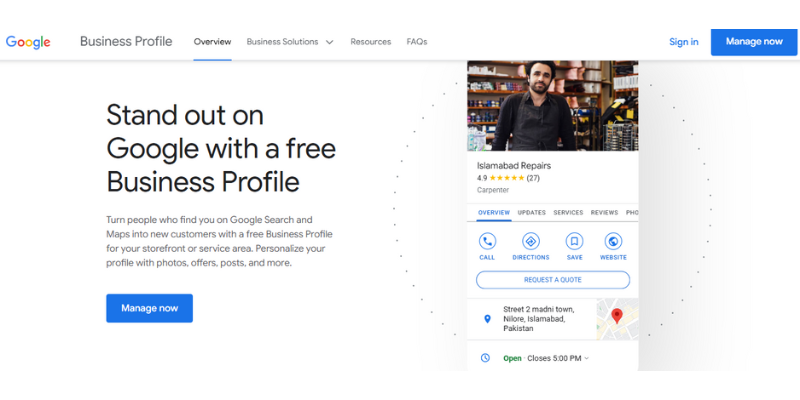
Google My Business (GMB) insights are one of the most crucial features for local SEO, as they provide valuable data on how businesses appear in Google Search and Google Maps.
GMB insights allow businesses to track key metrics such as search views, customer interactions, and actions like phone calls, website clicks, and direction requests.
This data helps businesses optimize their GMB profile and better understand customer engagement, enabling them to enhance their local SEO efforts.
2. BrightLocal
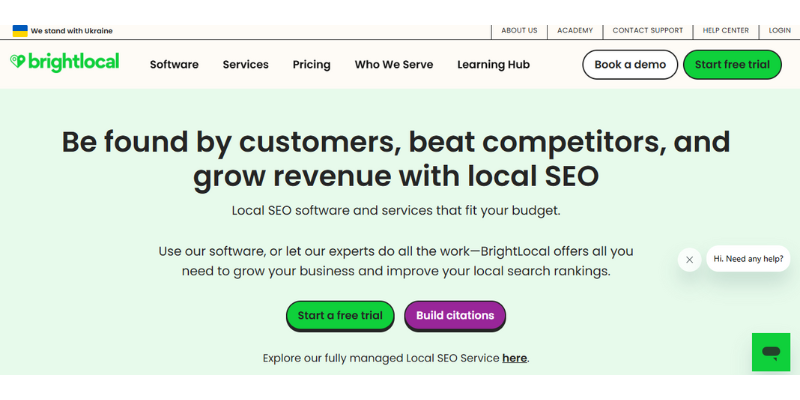
BrightLocal is an all-in-one local SEO reporting tool designed for digital marketing. It provides a comprehensive suite of features, including rank tracking, citation monitoring, review management, and local search audits.
BrightLocal is widely used by businesses to optimize their local SEO efforts, track performance across multiple locations, and gain insights into competitors' strategies. It helps businesses manage their local presence efficiently and consistently.
3. Semrush
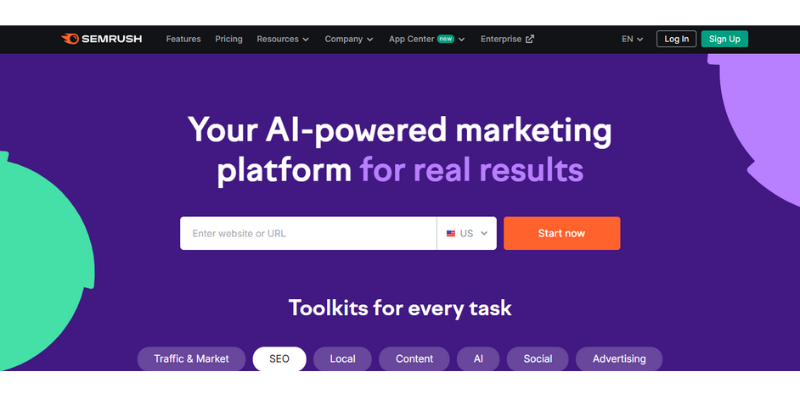
Semrush is a comprehensive SEO tool that offers a range of features suitable for local SEO, such as rank tracking, audit tools, and competitive analysis.
Semrush enables businesses to track their local rankings and monitor how they compare to competitors in their area.
It also offers keyword research tools that help identify local search opportunities and optimize content for better visibility in local search results.
4. Moz Local
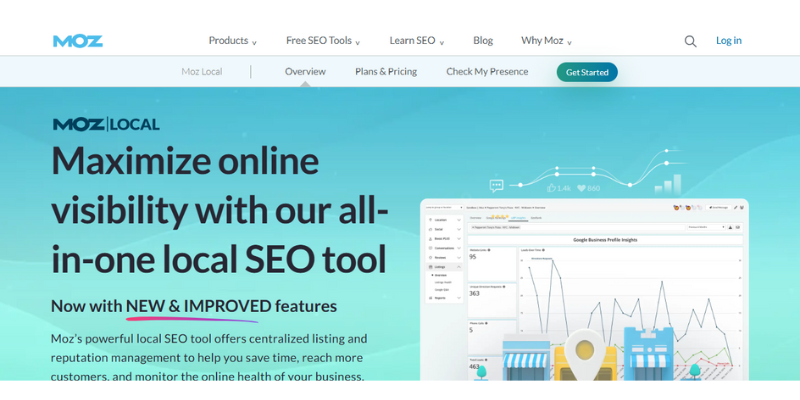
Moz Local is a tool specifically designed for managing local business listings and ensuring consistency across the web. Moz Local helps businesses maintain accurate and consistent NAP
(Name, Address, Phone Number) information across directories, search engines, and review sites.
By improving citation consistency, Moz Local helps businesses boost their local SEO rankings and make it easier for customers to find accurate business information online.
5. Yext
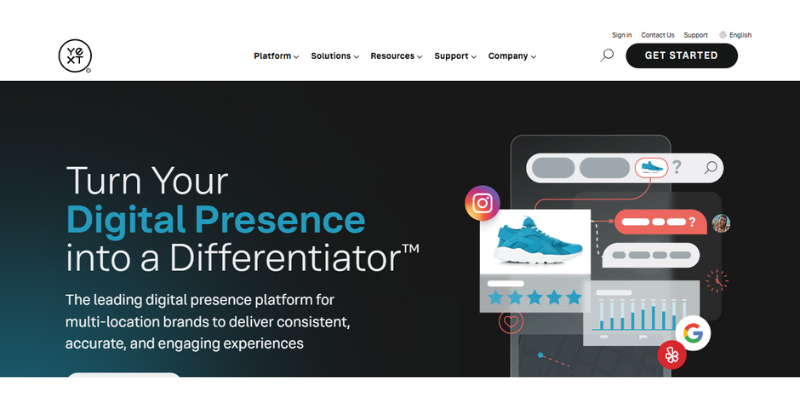
Yext is a powerful tool for managing a business's online presence across multiple directories, review sites, and mapping platforms.
Yext helps businesses ensure that their business information is accurate and up-to-date across hundreds of online platforms, which is crucial for local SEO.
By distributing consistent NAP data, Yext enhances local search visibility and helps businesses improve their chances of being discovered by local customers.
6. Whitespark Local Citation Finder
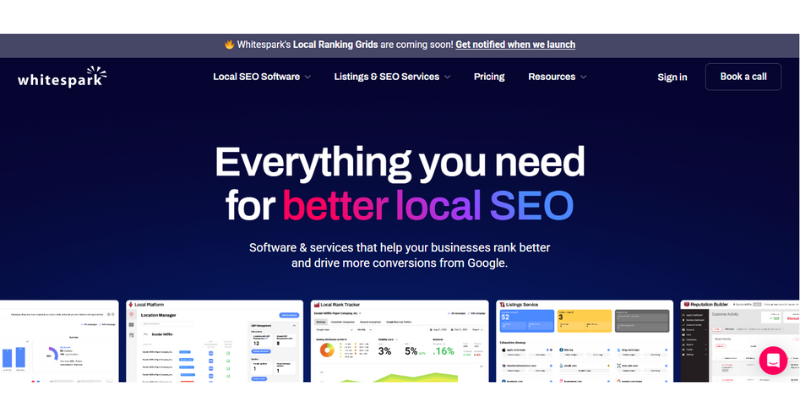
Whitespark's Local Citation Finder is a tool designed to help businesses find and build local citations, improving NAP consistency across the web.
The tool helps identify authoritative local directories and listing platforms where businesses should be featured to boost their local SEO.
By using Whitespark, businesses can track their citation efforts, identify opportunities for new citations, and improve their local search rankings.
7. Ahrefs

While Ahrefs is not specifically tailored for local SEO, it provides valuable insights into important aspects like backlinks, keyword rankings, and traffic analysis, which play a significant role in local SEO performance.
Ahrefs helps businesses understand their link profile, identify local link-building opportunities, and track the performance of their keywords, all of which contribute to improving local SEO rankings.
8. GeoRanker
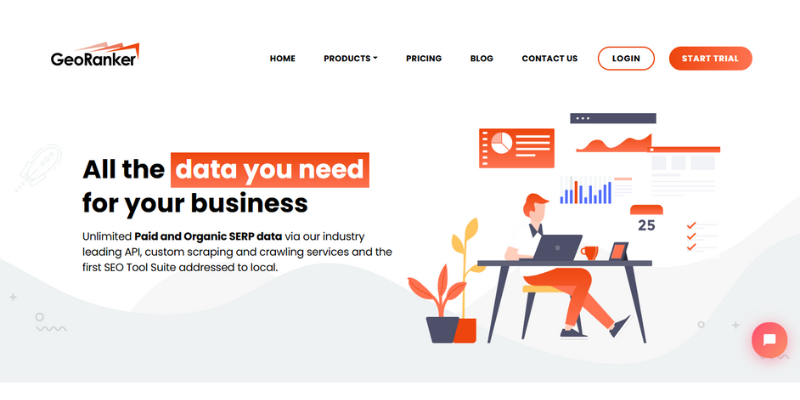
GeoRanker is a specialized tool focused on location-based rank tracking. It allows businesses to monitor their local SEO performance in specific regions or cities.
With GeoRanker, businesses can track local search rankings for targeted keywords, helping them understand their visibility in various geographic areas.
This tool is ideal for businesses with multiple locations or those that need to monitor their performance in specific regional markets.
9. SEO Report
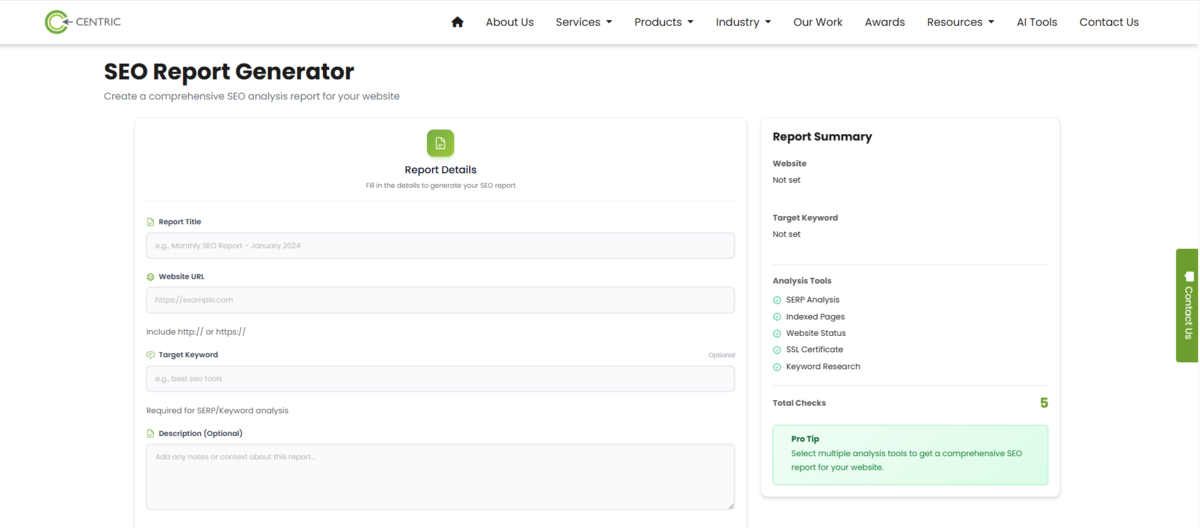
Leverage SEO Report Generator tool from Centric to generate comprehensive SEO analysis reports for your website instantly. Ideal for local SEO, it scans your online presence to provide actionable insights on visibility, performance metrics, and optimization opportunities across local search engines.
10. SERP Checker
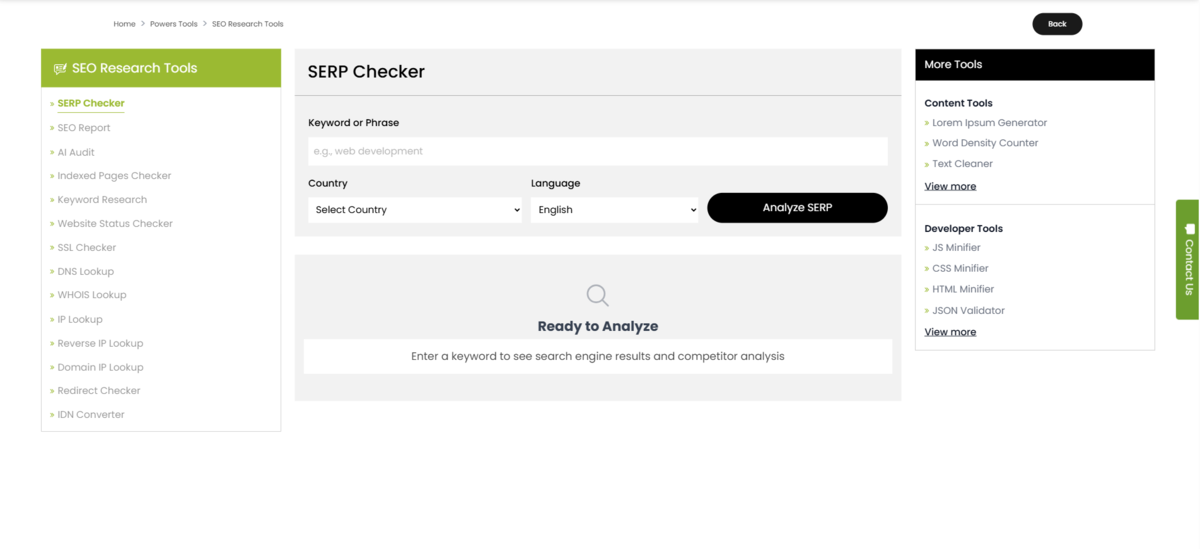
Track your local rankings, monitor competitors, and analyze overall visibility with this accurate SERP Checker tool from Centric. It delivers real-time data on how your business appears in location-specific search results, highlighting shifts in local pack positions or organic rankings. Perfect for ongoing reporting, it helps you benchmark against rivals and adjust strategies for better foot traffic and conversions in targeted cities or neighborhoods.
Track Your Rankings SERP Checker Tool
Comparison of Best Local SEO Reporting Tools
To assist in selecting the right local SEO tool, here is a comparison table of features across some popular local SEO tools:
|
Tool |
Rank Tracking |
Citation Tracking |
Review Monitoring |
Competitor Analysis |
Keyword Research |
Analytics Integration |
|
BrightLocal |
Yes |
Yes |
Yes |
Yes |
Yes |
Yes |
|
SEMrush |
Yes |
No |
Yes |
Yes |
Yes |
Yes |
|
Moz Local |
Yes |
Yes |
Yes |
Yes |
No |
Yes |
|
Yext |
No |
Yes |
Yes |
No |
No |
Yes |
|
Whitespark |
No |
Yes |
No |
Yes |
No |
No |
|
Ahrefs |
Yes |
No |
No |
Yes |
Yes |
Yes |
|
GeoRanker |
Yes |
No |
No |
Yes |
No |
No |
|
Places Scout |
Yes |
No |
No |
Yes |
No |
No |
|
Local Falcon |
Yes |
No |
Yes |
Yes |
No |
No |
| SEO Report | Yes | No | No | Yes | Yes | No |
| SERP Checker | Yes | No | No | Yes | No | No |
This table shows how each local SEO tool covers core areas, based on common features from various sources.
The Role of Local SEO Reporting Tools
Local SEO reporting tools help businesses track and analyze their local search performance, providing insights into rankings, reviews, citations, and competitor strategies to improve visibility and growth.
These tools provide in-depth insights into various aspects of local SEO, helping businesses monitor their rankings for local keywords, manage customer reviews, track citations, and evaluate the effectiveness of their Google My Business profile.
By using local SEO reporting tools, businesses can
-
Track Rankings: Stay updated on where they rank for key local keywords, ensuring they are visible to nearby customers.
-
Monitor Google My Business: Analyze essential metrics like search views, customer clicks, and actions taken on their Google My Business profile.
-
Analyze Competition: Understand how they fare against local competitors in terms of search rankings and other key performance indicators.
- Optimize Content: Ensure local keywords are integrated into website content, blog posts, and other marketing materials to improve local visibility.
Key Metrics Tracked by Local SEO Reporting Tools
Key metrics tracked by local SEO reporting tools include local keyword rankings, Google My Business insights, customer reviews, citations, and competitor performance.
-
Local Keyword Rankings: Monitor rankings for keywords with a geographical focus, such as city names or regional terms.
-
Google My Business Insights: Track metrics like search views, customer calls, clicks, and website visits generated from Google My Business.
-
Customer Reviews and Reputation: Stay on top of customer feedback, including reviews, ratings, and sentiment analysis, to maintain a positive reputation.
-
Local Citations: Ensure consistent NAP (name, address, phone number) information across local business directories, which is critical for local SEO performance.
- Competitor Performance: Evaluate local competitors' rankings to gain insights into their strategies and improve your own local SEO efforts.
7 Key Features of Local SEO Reporting Tools
Key features of local SEO reporting tools include rank tracking, Google My Business insights, competitor analysis, citation tracking, review monitoring, local keyword research, and analytics integration to optimize local search performance.
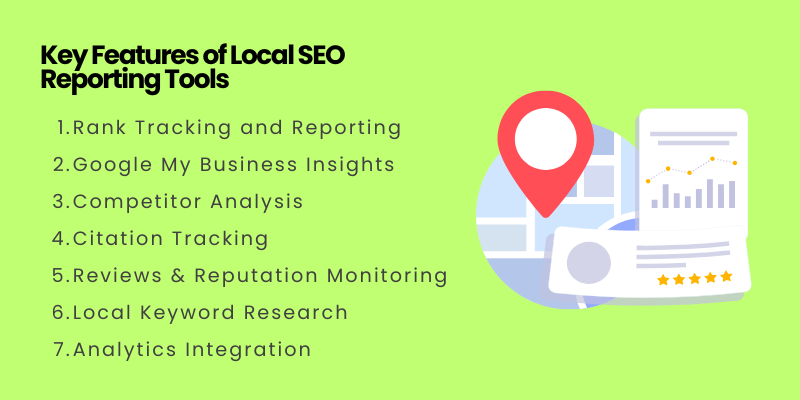
1. Rank Tracking and Reporting
One of the primary functions of local SEO tools is rank tracking, which lets businesses monitor how well they are performing for local search terms.
These tools track rankings in various locations, showing how the business appears in different geographic areas.
Track Your Rankings SERP Checker Tool
2. Google My Business Insights
Google My Business (GMB) insights are crucial for understanding how people are interacting with your business profile. SEO reporting tools integrate with GMB to provide reports on search views, clicks, and customer interactions, helping businesses optimize their GMB listings.
3. Competitor Analysis
Understanding how your competitors are performing in local search is key. Many local SEO tools allow businesses to compare their local rankings with those of competitors, enabling them to stay competitive and adapt their strategies accordingly.
4. Citation Tracking
Local SEO requires consistent citations across online platforms. Tools like Moz Local and BrightLocal provide citation tracking features, helping businesses ensure that their NAP is consistent across the web.
5. Reviews and Reputation Monitoring
Customer reviews are vital for local SEO. Tools that track reviews allow businesses to see how well they are managing their online reputation, respond to customer feedback, and identify potential issues.
6. Local Keyword Research
Effective keyword research is critical for ranking in local searches. SEO software for ranking tracking helps businesses identify local keywords that are relevant to their industry and area, allowing them to optimize their content and website structure.
7. Analytics Integration
Most local SEO tools integrate with Google Search Console and Google Analytics, allowing businesses to track how their local SEO efforts are driving traffic and conversions.
How to Use Local SEO Reporting Tools Effectively?
To use local SEO reporting tools effectively, set clear goals, monitor performance regularly, integrate SEO data with other marketing efforts, and act on the insights to optimize your local SEO strategy.
1. Setting Clear Local SEO Goals
To use local SEO reporting tools effectively, start by setting clear, measurable goals.
Whether your aim is to improve local search rankings, drive more website traffic, or garner positive customer reviews, defining your objectives will help you stay focused and guide your actions to achieve the best outcomes.
2. Regular Monitoring and Adjustments
Local SEO requires continuous monitoring. Use reporting tools to track your rankings, reviews, citations, and competitors regularly.
By consistently reviewing this data, you can spot trends, identify areas for improvement, and make adjustments to your strategy to maintain or improve your local SEO performance.
3. Integrating SEO Reporting with Other Marketing Efforts
Local SEO shouldn’t be managed in isolation. To maximize its effectiveness, integrate SEO data with other marketing initiatives, such as content marketing, email campaigns, and social media efforts.
This integrated approach ensures your SEO efforts align with your broader marketing goals, boosting overall business performance.
4. Understanding and Acting on the Data
The key to success with local SEO reporting tools lies in interpreting the data correctly. Use the insights from these tools to understand your current performance, identify areas of improvement, and refine your strategy.
Taking action based on data-driven insights will help optimize your local SEO strategy and enhance your overall results.
4 Best Practices for Local SEO Reporting
Best practices for local SEO reporting include regular reporting, accurate data interpretation, continuous optimization, and ensuring your business information stays consistent and up-to-date across platforms.
1. How Often Should You Report?
Local SEO efforts should be consistently tracked, with reporting occurring at least once a month. For industries with high competition, more frequent reporting can help identify opportunities for quick adjustments and improvements.
2. Interpreting Data Correctly
It’s essential to look beyond just rankings when interpreting SEO data. Consider other important factors such as customer actions (clicks, calls, website visits), reviews, and competitor performance to get a holistic view of your SEO strategy's effectiveness.
3. Continuous Improvement and Optimization
Regularly use insights from the best SEO reporting software to refine your strategy, making adjustments as needed to ensure continuous improvement. Local SEO is an ongoing process, and staying proactive in optimization is key to maintaining high performance.
4. Keeping Your Data Accurate and Up-to-Date
Maintaining consistent and accurate business information (NAP) across all platforms is critical for local SEO success. Regularly update your details and monitor any changes in algorithms that could impact your rankings to ensure your business remains competitive.
3 Challenges in Local SEO Reporting
Challenges in local SEO reporting include managing data overload, staying updated with Google's algorithm changes, and understanding regional variations in search behavior.
1. Handling Data Overload
One of the challenges of using local SEO reporting tools is managing the large volume of data they provide. It’s important to focus on the most relevant metrics, such as local rankings and customer actions, to avoid getting overwhelmed by unnecessary details.
2. Staying Current with Google’s Algorithm Changes
Google’s frequent algorithm updates can significantly impact local search results. To maintain and improve rankings, businesses must stay informed about these changes and adapt their SEO strategies accordingly to stay competitive.
3. Geolocation and Search Behavior Variability
Search behavior can vary widely depending on the region. Understanding these regional differences is essential when analyzing local SEO data to ensure accurate performance insights and to optimize strategies for specific geographic locations.
Local SEO vs. Traditional SEO
The primary difference between Local SEO and Traditional SEO lies in the geographical targeting.
1. Traditional SEO
Focuses on increasing the overall visibility of a website by targeting broad keywords without a geographical focus.
It aims to improve rankings for keywords that are not location-specific, such as “best pizza” or “top web development company,” with the goal of improving the site’s overall authority and traffic. The results can come from a wide range of locations.
2. Local SEO
On the other hand, focuses on improving visibility for location-specific queries. For example, if someone searches for “best pizza near me” or “web development company in Houston,”
Businesses that have optimized their local SEO will be more likely to appear in the search results. It specifically targets customers in the vicinity of the business and includes tactics such as
- Optimizing Google My Business (GMB) profiles to display accurate contact information and locations.
- Building local citations to ensure that business information is consistent across the web.
- Encouraging positive customer reviews can help businesses rank better locally.
- Using local keywords that include geographic locations in their search terms, like “web design in Houston” or “best bakery in Brooklyn.”
While traditional SEO might focus more on gaining authority and link building, local SEO puts greater emphasis on proximity, relevance, and the business’s presence in local search results.
Frequently Asked Questions
Which tool is most effective for managing local SEO efforts?
Moz Local is the top tool for managing local SEO in 2026, handling listings, reviews, and citations across directories. It tracks performance and ensures NAP consistency for better search visibility.
Can ChatGPT do SEO?
ChatGPT supports SEO tasks such as keyword research and content outlines in 2026, but cannot execute full strategies alone. Pair it with tools like Google Analytics for accurate implementation and results.
How to test SEO locally?
Run local rank scans with Local Falcon and check Google Search Console for queries, impressions and clicks. Validate structured data using Google's Rich Results Test to confirm local pack eligibility.
Is local SEO still relevant?
Local SEO drives strong results with 80% of local searches converting to customers. Over 46% of Google searches carry local intent, making it key for business traffic.
Conclusion
The best local SEO reporting tools help businesses improve their online presence and perform strongly in local search results. By using local SEO tools like BrightLocal, SEMrush, Moz Local, and others, Centric tracks key metrics such as rankings, customer reviews, and citations to stay ahead in their markets.
These local SEO platforms offer clear data to adjust strategies, increase visibility, and drive more customers to physical stores or online conversions. Whether you're a small business targeting your local area or a larger company with multiple locations, SEO software for ranking tracking and monitoring SEO program performance are essential for consistent growth.








